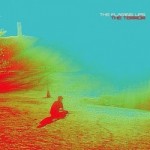Yamantaka // Sonic Titan : Dirt

Understanding Yamantaka // Sonic Titan requires, on some level, understanding Boredoms. Fans of the Japanese iconoclasts may recall fondly their embrace of rock, noise, metal and experimental sounds to forge music that was altogether bold, freaky and original. Pop Tatari and the Super Roots series are weird, masterful recordings that even still at this moment are the musical James Harden to contemporary avant garde’s Wesley Johnson, following that fateful crossover. You can see it, but you can’t touch. Yet, the inescapably catchy rhythms of a group that has defied convention for more than 30 years remain also undeniable. It’s hard to say if the Boredoms truly influenced anyone—the band was obviously shaped by many genres, hacking them up with a machete to create its performances —but one can’t help but marvel at how Yamantaka Eye and his co-conspirators interpret the sounds we know and love.
What makes the Bordeoms so hot to music nerds is most assuredly part of the recipe of attraction for Yamantaka // Sonic Titan. The Montreal/Toronto band fuses noise, metal, progressive rock and experimental pop elements not unlike the legendary Japanese crew, but does so in a far more accessible manner. Their melodies are irascible yet conventional, in a good way. Since YT//ST, the group’s 2011 debut, Yamantaka // Sonic Titan demonstrated their willingness to carry the flag for the most fearless corners of prog rock, heavy metal and adventurous improv, to the wonderment of all of us. That album was special for how it rejiggered familiar music in innovative ways, and was shortlisted for Canada’s Polaris Prize for its creativity.
Despite critical acclaim, the band sought new terrain. With 2013’s UZU, Yamantaka // Sonic Titan fully committed to their concept of noh-wave, a marriage of the No Wave movement of the late 1970s through 1980s that skewered commercially viable New Wave pop/rock and mainstream rock-tinged punk; and noh, a classical form of Japanese drama and performance art that emerged in the eighth century. They displayed early flashes of noh wave initially, but UZU marked a major turn in this regard. The indie and noise rock impulses on their debut were muted in favor of a more symphonic sound, featuring pianos and sweeping arrangements, such as in “Hall of Mirrors” or “Saturn’s Return.” Yamantaka // Sonic Titan was lavished with praise for this evolution, which, like the debut, also got a Polaris shortlist nod.
In 2015, Yamantaka // Sonic Titan co-founder and lead vocalist Ruby Kato Attwood and guitarist John Ancheta left the group. Kato’s departure in particular was huge, and listeners had to bear her exit in mind after 2016’s ephemeral, moody soundtrack for the video game Severed, which is credited to the band. Dirt, its first recording since then, shows Yamantaka // Sonic Titan ready to pursue noh wave in surprising ways.
When the first single, “Someplace,” was offered up in January, a lurch back toward the early days seemed evident. The track features the group’s other co-founder, drummer Alaska B., with a new lineup of bassist Brandon Lim, vocalist Joanna Delos Reyes and guitarist Hiroki Tanaka. More importantly, “Someplace” had heavy indie/jam/prog rock flavor to it, with a hint of world music reminiscent of early Dengue Fever. The classical orchestration of old has been supplanted with an ethereal approach. Such may have been dismaying to some who heard “Someplace,” but Yamantaka // Sonic Titan manage to keep it quirky enough to stay interesting.
On Dirt, that introductory cut rolls right into an equally sprawling “Dark Waters,” and its wildly theatrical presentation. It’s a delightfully curious song that still feels right at home among the current 1970s revival of progressive rock. “Yandere” is a more earnest than shameless foray into the waters Alan Parsons and Eric Woolfson crossed like rock’s Lewis and Clark decades before. On Dirt, Yamantaka // Sonic Titan avoid being too derivative and instead put a smart spin on prog with their noise and metal influences. These sounds are most pronounced on “The Decay,” with its outsized guitar riffs and free-flowing density, and “Beast,” which relents on expansive Pan-Asian arrangements for an arena rock-chiseled grandiosity, complete with touches of horns and keyboards. Peter Frampton never dies.
The group keeps Dirt from getting too messy and self-indulgent often on the strength of Delos’ vocal, which passionately conveys the right emotion at the perfect time. Longtime fans will certainly miss Kato right now, but Delos is gifted, lifting up “Hungry Ghost” to impressive heights with an understated performance amid a tidal wave of sound. The cascade of noise is most reminiscent of the sonically swashbuckling Eye, especially with its abortive close. Delos retains control on the title track, a stunning heavy rock opera, as well as on “Tawine,” a pensive track that embodies the ideal of noh wave.
It is difficult to pinpoint exactly where this group can most arrestingly stand out with this direction long term, although it is almost certain that the Yamantaka // Sonic Titan will continually evolve as they have on previous records. The album’s closer, “Out of Time,” may offer hints as to the group’s future, with its distortion-filled, indie rock-ish foray providing a hopeful bounce. Among all the songs, it is one of the most approachable. Barring large-scale lineup changes again, Yamantaka // Sonic Titan may be quite tantalizing as the current collective gels. Dirt is indicative of significant growth for Yamantaka // Sonic Titan, which seems stronger for letting its art rather than its oddity speak loudest.
Similar Albums:
 Flaming Lips – The Terror
Flaming Lips – The Terror
 Liars – TFCF
Liars – TFCF
 Can – Ege Bamyasi
Can – Ege Bamyasi

